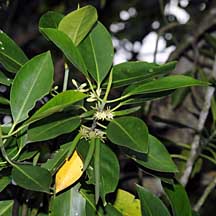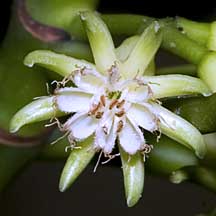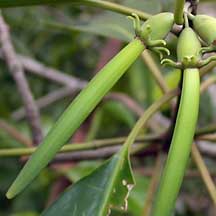 |
|
| plants text index | photo index |
| mangroves > Bruguiera in general |
| Bakau
putih Bruguiera cylindrica Family Rhizophoraceae updated Jan 2013 Where seen? This is probably the most commonly seen tree in our mangroves. It is particularly common in the back mangroves. It has been described as characteristic of newly established substrates and able to withdstand prolonged submersion. It may form pure stands. It was formerly called B. caryophylloides. Features: Tree to about 20m, but those seen along our nature trails often almost short shrubs about 1m, to short trees to 2-3m. Bark greyish with small corky bumps (lenticels). Short buttresses and also knee roots. Leaves eye-shaped (6-17cm long) stiff leathery glossy, arranged opposite one another. Stipules pale yellow or greenish. Flowers small (1cm), 2-5 emerging from one short stalk. Calyx cup-shaped pale greenish or white with 8 stout, long lobes. Petals thin, white tipped with tassels. The petals turn brown rapidly. According to Tomlinson, the flowers are pollinated by day flying insects such as butterflies. The petals of the flower hold loose pollen and are under tension. When probed at the base, the petal unzips to scatter a cloud of pollen over the head of the visiting insect. Propagule develops on the parent plant: thin, cylindrical hypocotyl (8-15cm long) with the calyx lobes bent up towards the stalk. Light green ripening to purple, the hypocotyl is often slightly curved. Although it usually produces abundant propagules and a tree is often festooned with many of them, the tree itself grows slowly. According to the NParks Flora and Fauna website, the tree is the preferred local food plant for caterpillars of the moth Olene mendosa. Human uses: According to Burkill, the propagules are occasionally eaten after boiling, and according to Giersen eaten with sugar and coconut. Fishermen do not like to use the wood for fish-traps as they say it has a peculiar smell that frightens fishes away. According to Giersen, the timber is heavy and reddish. |
 Pulau Ubin, Dec 09  Pulau Ubin, Dec 09 |
 Small flowers, several in a cluster on one stalk. Calyx usually pale. Sungei Buloh Besar, Apr 11 |
 Tassels on petal tips. Sungei Buloh Besar, Jun 11 |
 Sepals on propagules bend towards stalk. Sungei Buloh, Apr 02 |
| Bakau putih on Singapore shores |
| Photos Bakau putih for free download from wildsingapore flickr |
| Distribution in Singapore on this wildsingapore flickr map |
|
Links
References
|
|
|